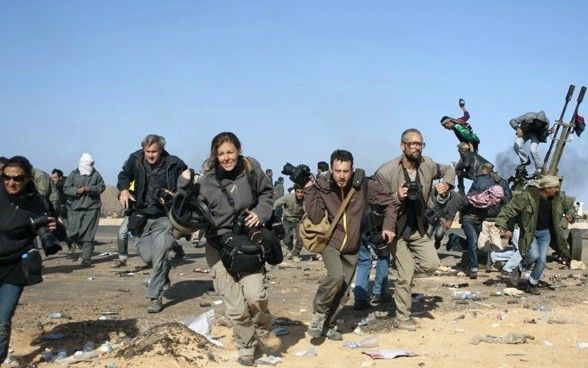With 929 Killed In Two Decades, It's A Deadly World For Journalists

In all, 929 journalists have been killed around the world during the past 20 years. That translates to almost 50 of them dying on the job every year.
Those figures, from the Committee to Protect Journalists, an independent nonprofit group that describes itself as an organization to promote "press freedom worldwide by defending the rights of journalists to report the news without fear of reprisal," reveal the deadly side of journalism.
Chillingly, 70 percent of those killed, 648 people, were murdered. In those cases, 90 percent of the perpetrators got away with impunity. CPJ says that, no surprise, more than one-half of the leading suspects in most cases are thought to be affiliated with local "political groups" or are themselves government officials.
And in cases where journalists were targeted for murder, 13 percent were tortured before death.
The vast majority of those killed in a given country were also local citizens, not foreign visitors -- statistics that speak to the failure of many governments to protect their own nationals and of their hostility to freedom of speech.
An uptick in deaths since 2003, preceded by a period of relative declines over the mid- to late 1990s, suggests the war in Iraq has also had a strong effect on where attacks against journalists have taken place, but trends in Iraq also corresponded chronologically with increases in Mexico and Somalia.
Recent deaths include Japan Press' Mika Yamamoto -- a longtime correspondent for Japanese media in far-flung and strife-ridden countries -- from gunshot injuries while embedded with the Syrian opposition in Aleppo. Already this year, 22 journalists have been killed in Syria, the majority of these deaths attributed to being caught in crossfire and being hit on the battlefield. Only 18 percent of total journalist deaths since 1992 have resulted from similar causes.
Victims in past years also include prominent Russian journalist Anna Politkovskaya, who became famous for her critical writings on the Chechen wars. The circumstances surrounding her death in 2006 remain largely shrouded in mystery.
Iraq was ranked as the deadliest country in the world for journalists. Afghanistan, perhaps surprisingly, was only the 10th deadliest. The Philippines ranked second, followed by Algeria, Russia, Colombia, Pakistan, Somalia, India, and Mexico.
However, CPJ's data over the years show that Colombia and Algeria have become far safer places for journalists at present than in the past. The Philippines, which routinely had far fewer than 10 journalist deaths per year, saw an astonishing 38 journalists killed in 2009.
Although numerous other countries have a better "safety record," the number of imprisoned journalists has also risen, more than doubling between 2000 and 2011. Last year, some 179 were jailed worldwide -- including 42 in Iran, 28 in Eritrea, and 27 in China.
On World Press Freedom Day, May 3, United Nations Secretary-General Ban Ki-Moon noted that journalists around the world "face intimidation, harassment and censorship at the hands of governments, corporations, and powerful individuals seeking to preserve their power or hide wrongdoings and misdeeds."
Speaking through video to the early July gathering of the Second World Media Summit held in Moscow (attended by major state-owned and private news organizations), Ban again urged governments to take more action to protect the fourth estate.
"Changes in media are opening a world of opportunities. But we are also seeing rising threats to press freedoms and media professionals," said Ban. Many have been "detained, threatened or silenced through fear and censorship. Journalists are under threat not only in conflict zones, but when they report on governments, police, and businesses -- or drug cartels and arms merchants."
He added: "A free media is critical to true democracy and sustainable development. As we navigate these changing times, let us stay true to the unchanging principle that a free media must thrive."
© Copyright IBTimes 2025. All rights reserved.




















